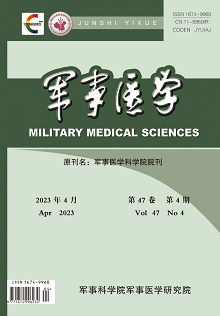Original articles
SHI Tong, FU Zhen-huan, WANG Ru-zhou, ZENG Jia-min, LI Ting, LI Hai-bo, HAN Xiao-xian, AN Gai-hong, MA Qiang
Objective To explore the effects of different types of fatigue and negative emotion factors on sleep quality and to analyze the correlations between sleep quality and alertness so as to provide data for improving sleep quality and cognitive ability of soldiers. Methods A total of 142 male soldiers were selected. Levels of fatigue, emotional state, sleep quality and alertness were measured using the Fatigue Symptom Questionnaire, Symptom Checklist?90 (SCL-90), Pitts?burgh Sleep Quality Index (PSQI) and Psychomotor Vigilance Task (PVT) respectively. Results The PSQI score of these soldiers was 5.16±2.66, which was significantly higher than the norm for adults (P<0.01) but lower than the norm for soldiers stationed on the plateau and along frontiers (P<0.05). Soldiers with a PSQI≥7 were considered to suffer from sleep disorders, accounting for 31% of the soldiers tested. The total scores of fatigue, SCI?90 and PSQI were positively correlated (r=0.40, P<0.01;r=0.48, P<0.01), and psychosensory symptoms were positively correlated with daytime dysfunction (r=0.54, P<0.01). When the sleep disorder group was compared with the good sleep group, there were significant differences in each dimension of fatigue and sub?factor of emotion (P<0.05). The total score of fatigue (B=0.03, P=0.023) and that of SCL?90 (B=0.07, P=0.015) were the primary determinants of sleep quality. The total score of PSQl (B=0.01, P<0.01), which was an influencing factor of alertness, was positively correlated with the mean reaction time of PVT (r=0.55,P<0.01). Conclusion Compared with ordinary adults, the soldiers take a much longer time to fall asleep, which is likely to lead to serious sleep problems, such as a significant decline in subjective sleep quality, sleep time and sleep efficiency. The cumulative effect of various types of fatigue, negative emotions, and the synergy between fatigue and emotions can impact sleep quality. Targeted measures can be taken to improve sleep based on the cumulative effect and synergy among various factors. Regulation of sleep is critical to posts which require high alertness. Sleeping longer before tasks, naps between tasks, and active adjust after tasks can help maintain alertness.
